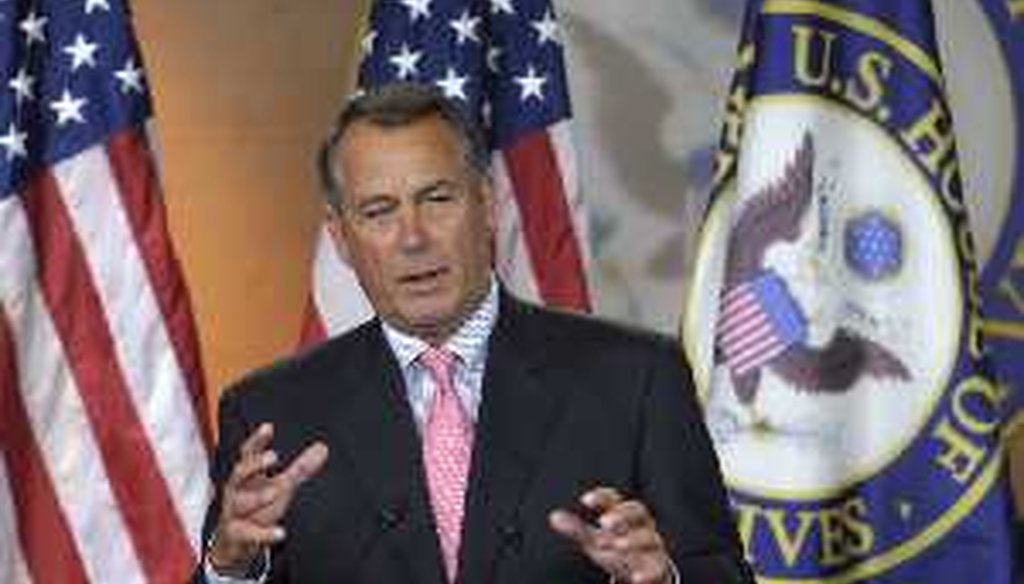Stand up for the facts!
Our only agenda is to publish the truth so you can be an informed participant in democracy.
We need your help.
I would like to contribute

House Speaker John Boehner of Ohio gestures during a news conference Dec. 1, 2011, on Capitol Hill in Washington.
Washington’s focus may have been shifted to deficits, but jobs are still a potent force in political discourse, where few expressions are more damning than "job killing" or more complimentary than "job creating."
Led by Speaker John Boehner, Republicans cite the "Forgotten 15," which they describe as jobs bills that have passed the Republican-controlled House but not the Democrat-led Senate.
Boehner gave members a "GOP pocket card" listing the Forgotten 15, saying its distribution would show they were doing everything they could to improve employment.
The actual count has grown from 15 — Boehner this week referred to 25 bills now stuck in the Senate — but the message has not changed:
"At least 15 jobs bills have passed the House this year with significant bipartisan support and are now sitting in the Senate waiting to be brought to a vote by the Democratic leadership. My colleagues and I have begun to refer to these jobs bills as the ‘Forgotten 15,’ Boehner wrote in a newspaper piece with Rep. Bob Gibbs of Ohio’s 18th District.
PolitiFact Ohio was interested in the bills that Boehner said were in legislative limbo, given that in an opposite claim, that Republicans had introduced "zero" job creation bills, PolitiFact.com gave it a rating of Pants On Fire.
Checking the basic facts was easy. Boehner’s website has links to the Forgotten 15 and to the "House Republican Plan for America’s Job Creators," a scorecard of legislation kept on the site of House Majority Leader Eric Cantor. When we checked, its list of measures passed by the House and awaiting Senate action had increased to 21.
We confirmed their status using THOMAS, the legislative-tracking website run by the Library of Congress.
That left the question of whether they are jobs bills, a question that is not easily answered.
We started at the top with House Resolution 872, the Reducing Regulatory Burdens Act. It is listed as No. 1 on the Forgotten 15 and was cited specifically by Boehner in the newspaper piece.
The bill aims to reduce overlapping federal regulation on pesticides, thereby reducing costs to both farmers and small business owners. Introduced by Gibbs, it passed in the House on March 31 by a vote of 292-130, indicating significant bipartisan support.
THOMAS indexes every piece of legislation by subject terms that describe the measure’s substance and effects. Those subject labels number nearly 1,000 and are assigned by legislative analysts from the Congressional Research Service, a non-partisan arm of Congress.
Labeling a bill with a subject category doesn’t mean the bill is primarily about that issue. For instance, a very large number of congressional bills are categorized as being tax-related because they have some impact on the tax code, even if it’s tangential.
There is no "Job creation" label. Related subjects include "economic development," "economic performance and conditions," "employee hiring," "employment and training programs," "labor and employment," "unemployment" and "wages and earnings."
H.R 872 carries these CRS index terms: environmental protection, administrative law and regulatory procedures, agricultural pests, Environmental Protection Agency (EPA), environmental regulatory procedures, hazardous wastes and toxic substances, licensing and registrations, state and local government operations and water quality.
It carries no employment-related tags.
We know, however, that "job creation" means different things to different parties. And why it’s not so easy to define what makes a jobs bill.
Most conservatives today oppose traditional forms of government-based economic stimulus known as Keynesian economics, primarily spending initiatives. So if "job creation" is defined to primarily include Keynesian initiatives, then Republicans aren’t going to be sponsoring any "job creation" bills. Instead, Republicans argue that cutting taxes, budgets and regulations will help the economy prosper.
That Republican view is, in fact, what Boehner and Gibbs argue, and it is the reasoning behind the entire list, as Boehner’s office confirmed when we called.
Who’s approach is right? PolitiFact Ohio isn’t taking a side in that policy debate.
Boehner and Gibbs say H.R. 872 would overturn a court decision that imposes "job-crushing permitting requirements" and poses "just another government obstacle to job creation at a time when our economy can least afford it."
Does that make it a jobs bill?
We put the question to Otto Doering, a professor in the Department of Agricultural Economics at Purdue University and a widely recognized farm policy and public policy specialist.
"I know the bill very well," he told us, adding that it had his support. Opposed by some environmentalists, it would "correct" a federal court decision declaring that a farmer spraying pesticide on a field, where the spray could reach a stream, would be required to meet extra Clean Water Act permitting requirements.
Doering argues the bill has nothing to do with employment. "If anything, not passing the bill would create employment by requiring a whole new mess of regulators and inspectors and people out there."
We returned to THOMAS and searched the rest of the Forgotten 15. Only one of them — the Protecting Jobs from Government Interference Act, HR 2587 — carried a CRS subject label related to job creation, "labor and employment."
What can we conclude?
Boehner was correct that at least 15 measures have passed the House with bipartisan support and remain stuck in the Senate.
Whether they can be described as "jobs bills" relies on the theory that cutting taxes, budgets and regulations will stimulate the economy and thereby lead to more employment. That belief is at least arguable and we’re not ruling whether it’s right or wrong.
But again, knowing whether he is correct requires knowing which economic philosophy will work best in the long run. That is the lynch pin of this debate, and the reason we have not rated Boehner’s claim on the Truth-O-Meter.
Our Sources
CQ Transcripts, "House Republican Leaders Hold News Conference," Nov. 4, 2011
Rep. John Boehner, video, "Mr. President, Help Pass the 'Forgotten 15' Jobs Bills Stuck in the Senate," Oct. 27, 2011
Chillicothe Gazette, "Senate needs to act on 'Forgotten 15,'" Nov. 6, 2011
Washington Times, "Dead-end Senate," Nov. 1, 2011
Rep. John Boehner, news release, Oct. 26, 2011
Rep. John Boehner, news release, Oct. 27, 2011
Rep. John Boehner, GOP pocket card, Oct. 25, 2011
Rep. Kevin McCarthy, "The forgotten 15"
Rep. Eric Cantor, "Plan for America’s Job Creators"
PolitiFact, "Blog post says GOP has sponsored "zero" job creation bills," Oct. 25, 2011
Library of Congress, THOMAS
Library of Congress, THOMAS subject areas
Open Congress, H.R. 872
Interview with Otto Doering, Purdue University, Nov. 18, 2011
Interview with Boehner press office, Nov. 22, 2011




















































